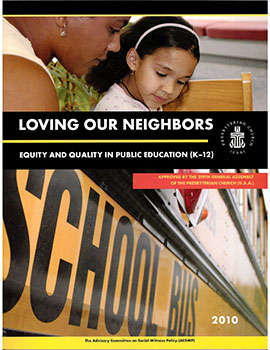
This study examines the multiple economic, racial and ethnic, and social disparities that weigh down our current education efforts and impede them from fulfilling this role. The study acknowledges the negative national consequences of an emerging dual track education system- one privileged, one not-and calls for reforms and reinvestment in public education (K-12) in order to offer all children similar opportunities to develop their talents to the fullest and become constructive citizens. From the perspective of the Reformed tradition, with its longstanding commitment to expanding educational access, the study celebrates the value of sharing educational approaches while building a common democratic ethos in our society. Charter schools, for example, are a product of the frustration that people feel with the shortcomings of the current system and their desire to experiment with alternative approaches. Yet the privilege, based in economic status, to choose an educational alternative for one’s own child does not absolve anyone from the obligation to support the public schools that educate the vast majority of our nation’s children.